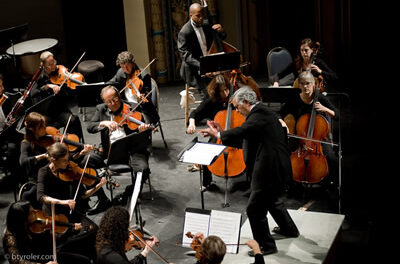Duke Performances brought the unusual company Classical Theatre of Harlem to Reynolds Theater for a residency including work with local schools and universities and a revival of the funky Melvin Van Peebles play Ain’t Supposed to Die a Natural Death, and culminating with a two-night run of the company’s adaptation of Shakespeare’s Romeo and Juliet.
Having seen CTH’s almost dancerly version of King Lear last winter, I was expecting the movement-driven staging in a minimal but versatile set with costumes and music that effectively transferred the action to an imagined Harlem of the near future. I was not prepared for the radical reduction of the play to a one-act from which much gorgeous language had been excised, or for the directing choices that made the speeches the least important aspect of the production. And I was truly not prepared for most of the tragedy, and all of the subtlety, in this tragic play being supplanted by a cheap TV-style comedy.
Although there were some very clever bits, such as causing the Friar’s message to Romeo to go astray by sending a FedEx letter via UPS, and making the apothecary a homeless drug pusher, it is hard for me to imagine that anyone familiar with the play from page, stage or screen would have been satisfied with this production. I can see that it could — and probably did, judging from audience reaction — work for inexperienced viewers. It functions somewhat like West Side Story did, putting the story in a contemporary context for people not used to making the imaginative leap across time and cultures to get at the timeless human drama. However, in West Side Story, there is no flattening or attenuation of the dramatic arc, no rushing through the speeches so that they became incomprehensible, no replacement of characterization with bombastic posturing.
The West Side Story reference is inescapable, because Andrea Cosley as the Nurse reminds one very much of Rita Moreno in the movie’s parallel role. The Nurse was one of the more sympathetic characters here, but the only one who elicited positive feeling in me all the way through was Benvolio (the talented Tracy Jack). Juliet (Robin LeMon) had a fine moment in the balcony scene — but why was she mooning over that jerk Romeo? Romeo (Duane Allen) was good in the tomb scene — but why was he killing himself over her? Mercutio is generally my favorite role, but this Mercutio (Daniel Morgan Shelley) was so repellent that I was glad he died, and Tybalt (the sleek and powerful Keith Jamal Downing) was so ludicrous in his complaint that Romeo was interrupting their “solemnities” at the Capulets’ nasty rout of a party that I wasn’t sorry when Romeo skewered him, either.
Ideally, when watching Romeo and Juliet, you feel at least a little empathy for everyone — otherwise, where’s the tragedy? The tragedy here was that this was a kind of Cliff’s Notes version of the play, with a bullet for each action point but no discussion of its meaning or moral value, and perhaps the worst thing about it is that many people who saw this production now think they know the play.
Classical Theatre of Harlem: http://www.classicaltheatreofharlem.org/. Duke Performances: http://dukeperformances.duke.edu/programs/shakespeare/romeojuliet.php [inactive 8/08]. SHAKESPEARE RESOURCES (courtesy the University of Virginia): http://etext.virginia.edu/shakespeare/ [inactive 3/10]. E-TEXT (courtesy UVa): http://etext.virginia.edu/toc/modeng/public/ShaRJF.html (1623 First Folio Edition) and http://etext.lib.virginia.edu/toc/modeng/public/MobRome.html (1866 Globe Edition).











